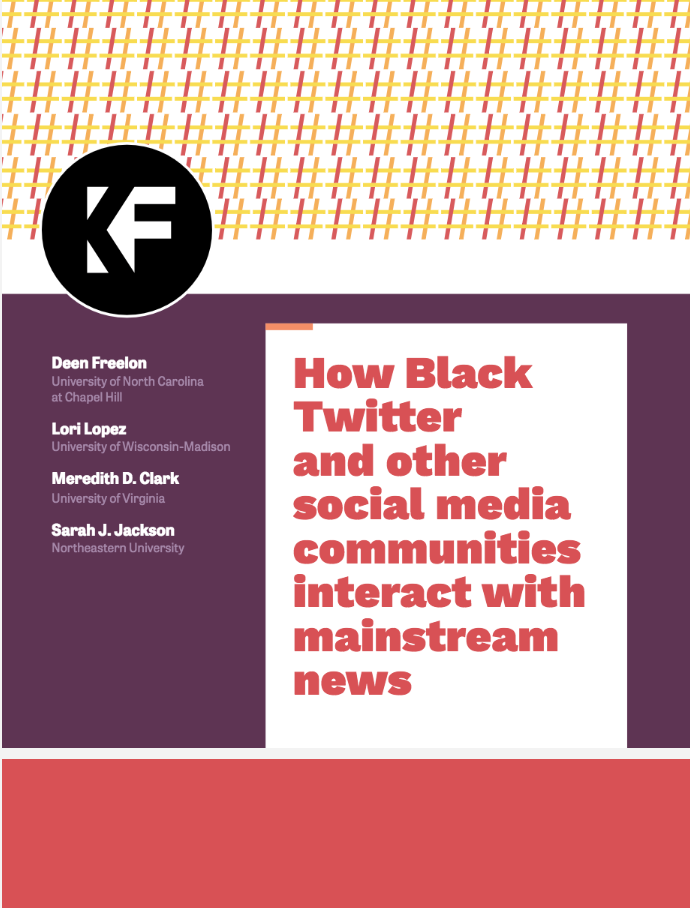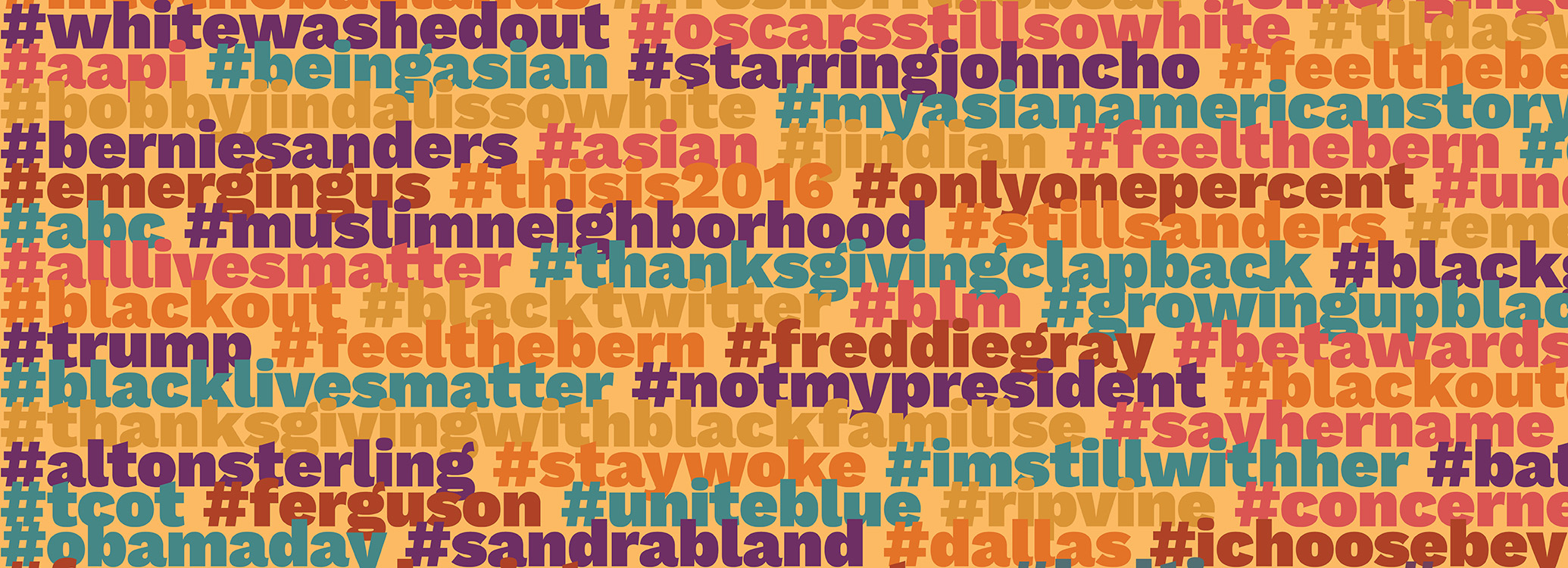MIAMI – Feb. 27, 2018 – As news organizations increasingly look for new ways to engage audiences and better understand the needs of diverse news consumers, a new report explores how social media subcultures – Black Twitter, Feminist Twitter, and Asian-American Twitter – interact with the news and offers recommendations to strengthen the relationship between journalists and these communities.
Commissioned by the John S. and James L. Knight Foundation, the report is the largest study ever conducted of interactions between the news media and these online groups. It analyzes more than 46 million tweets with community-related hashtags from 2015-16, revealing how these communities use digital media to access news they can trust, and their perceptions of news coverage. It also includes findings from in-depth interviews with community participants and journalists.
The findings reveal low levels of trust toward news media in these communities, highlighting the ways in which these groups often bypass news media institutions as a means to raise awareness about issues important to them. It captures favorability scores for news organizations that get the most attention, which include Buzzfeed, CNN, Huffington Post, The New York Times and The Washington Post among others.
Gaps in media coverage of certain topics are also highlighted, as are the ways in which reporters interact with these communities to develop and source stories. Taken together, the findings provide news organizations with a reference point for developing new approaches to covering these communities and evolving their current practices.
In addition, the report includes recommendations for journalists looking to improve their relationships with these online communities, proposing deeper methods of engagement, connection and transparency. It emphasizes a new urgency for newsrooms to hire more staff from these communities and close the diversity gap in mainstream media. At the same time, an increased focus on representation – portraying the many layers and complexities of a community – is reinforced as a necessity across the media landscape.
“These online communities came together organically to create a forum for discussion and debate around issues they care about; they include an audience of the most engaged and influential digital consumers. With this in mind, the report provides a starting point to examine how these communities perceive and consume news, and which sources they trust,” said Olivier Kamanda, Knight Foundation director for learning and impact.
The report aligns with Knight Foundation’s efforts to advance diversity and excellence in journalism. Key findings include:
- Twitter subcultures give voice to issues that mainstream media don’t cover: Participants often use Twitter to share and raise awareness about issues of concern on their own terms without waiting for journalists to take interest.
- Community members express low levels of trust in the media: A favorability analysis of 23 major news outlets showed that participants were twice as likely to express a negative view of a news outlet as a positive view. They also criticized and censured news media outlets more often than praising and endorsing them. However, the most criticized outlets were usually also the most shared.
- Media critique often relates to how issues are framed: Media criticism is generally directed not at fake news but at what is perceived as harmful framing by the media; participants are not so much disputing the basic facts as asking why certain facts are being emphasized at the expense of others.
- Participants bypass mainstream media as a news source: Some community members use Twitter as a curated news source to avoid problematic portrayals by mainstream media outlets.
- Media rely on Twitter subcultures as a source of news: Journalists view Twitter as a highly productive tool for gathering story ideas and insights.
- Participants are concerned about story mining by journalists: Active participants did not like having their tweets harvested by journalists for stories without permission, citing two major concerns: lack of control over intellectual property and the potential for online harassment.
- Engagement doesn’t equal favorability: The number of times a story is shared on social media is often seen as an endorsement by news organizations, and shares are important metrics for news impact. However, the analysis revealed that popularity in terms of share counts does not necessarily mean approval or trust. BuzzFeed, The Washington Post, The New York Times, HuffPost and CNN—were among the top 10 most shared outlets across all three communities. Of these, only one – BuzzFeed – had a favorability score above zero.
- Participants tend to share news content that covers their community’s high-visibility Twitter activities: The data revealed feedback loops in which participants created compelling Twitter content, media outlets covered it, and the community then circulated the media coverage of its own content.
“A strong future for journalism is dependent on accurate reporting that reflects the stories and concerns of all of our communities,” said LaSharah Bunting, Knight Foundation director for journalism. “The report offers a window into how some of these communities interact with the news on their own terms, opening an opportunity for journalists to connect with their audiences in new and different ways.”
The report was co-written by researchers: Meredith D. Clark (University of Virginia), Deen Freelon (University of North Carolina at Chapel Hill), Sarah J. Jackson (Northeastern University), and Lori Lopez (University of Wisconsin-Madison).
To make these results widely accessible, Knight Foundation partnered with Postlight, a digital product studio with deep experience in the media and journalism space. Using information design and data visualization tools, Postlight created a dynamic, engaging site with shareable takeaways that will further the social media conversation around how these subcultures are represented in traditional and new media. On March 26 Knight is collaborating with Postlight to host an event in New York; the event will be streamed live on Knight’s Twitter page starting 3 p.m. ET.
On March 8 Knight Foundation will host a Twitter chat at noon ET to answer questions about the report and connect with people around ways to strengthen the relationship between journalists and these communities.
Support for this report forms part of Knight Foundation’s effort to advance diversity and excellence in journalism. Knight has made many investments in this area, including support for the Ida B. Wells Society for Investigative Reporting, City University of New York’s Graduate School of Journalism diversity initiative, Poynter’s Leadership Academy for Women in Digital Media, and journalism programs at historically black colleges and universities. The foundation also supports journalists of color through organizations such as the National Association of Black Journalists, the National Association of Hispanic Journalists, the Asian American Journalists Association and the Robert C. Maynard Institute for Journalism Education.
To read the report and explore the findings visit: http://kng.ht/twittermedia.
About the John S. and James L. Knight Foundation
Knight Foundation is a national foundation with strong local roots. We invest in journalism, in the arts, and in the success of cities where brothers John S. and James L. Knight once published newspapers. Our goal is to foster informed and engaged communities, which we believe are essential for a healthy democracy. For more, visit knightfoundation.org.
CONTACT:
Anusha Alikhan, Director of Communications, John S. and James L. Knight Foundation, 305-908-2646, [email protected]
R
-
Journalism / Article
-
Information and Society / Report
-
Journalism / Article



